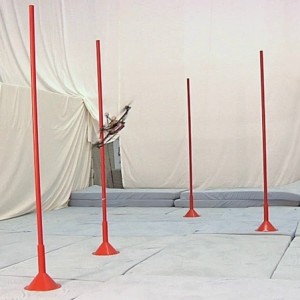
Robohub.org
Quadrocopters learn from prior experience to improve slalom flying

A new video released today by researchers from the Flying Machine Arena shows how a quadrocopter is able to learn from prior experience to improve future performance.
This new research is an extension of results published last year by the same group, which show how quadrocopters can learn to fly high-performance slalom courses (video).
Much like humans learn through repetition and practice, the quadrocopter repeatedly flies the slalom course, records any errors made and then tries to compensate for these errors during the next attempt.
However unlike human-skill-learning, the experience gained by flying one slalom course, was not carried over to a new course – these had to be learned from a state of zero experience.
A new video released by the group today (embedded below), extends this research and enables the quadrocopter to learn from prior experience.
By using knowledge of previously flown slalom courses, the quadrocopter is able to improve its performance on unseen courses, to the point where they can be accurately flown the first time, without practice.
Full Disclosure: I am the lead author of the video and associated research.
tags: Algorithm AI-Cognition, Algorithm Controls, c-Research-Innovation, Flying, Research, Robotics technology


